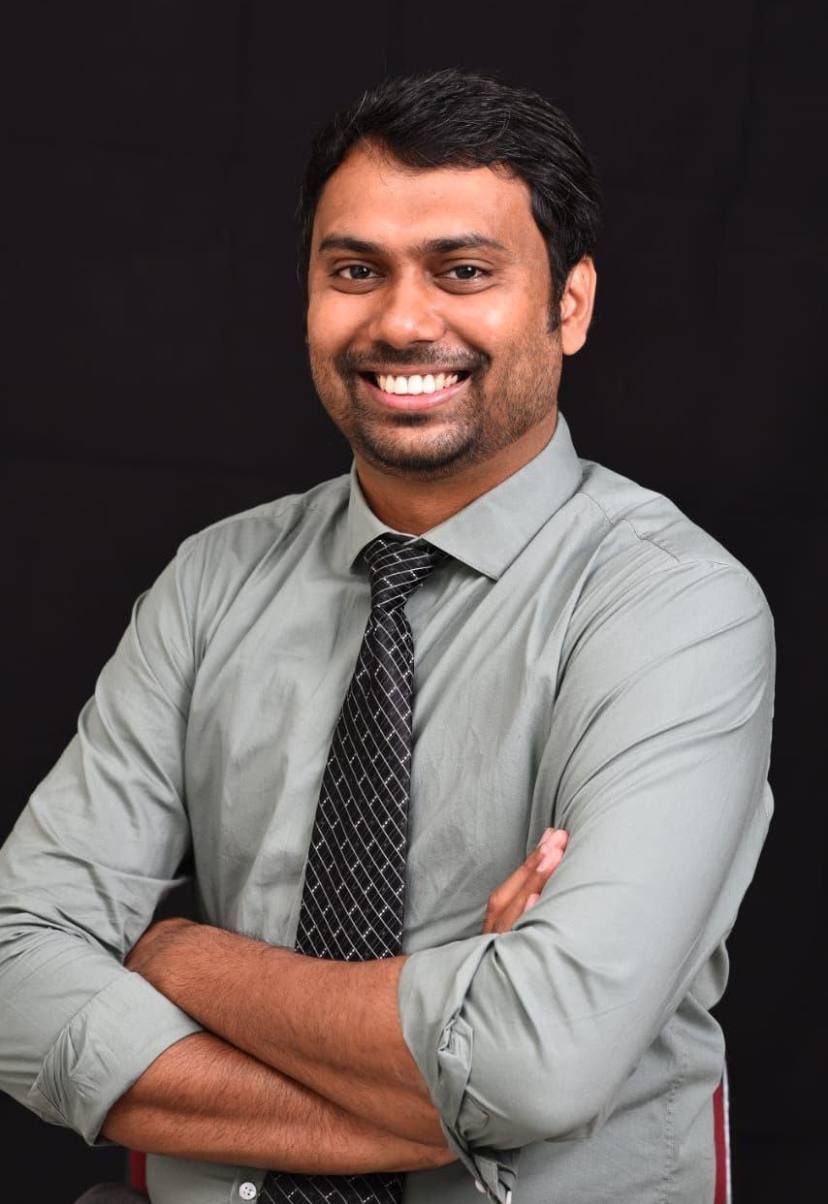Bio
Under-graduation: BDS (Bachelor of Dental Surgery) Meenakshi Ammal Dental College, Meenakshi Academy of Higher Education and Research Maduravoyal, Chennai. (From 2006 – 2012)
Post-graduation:
MDS (Master of Dental Surgery) Sri Ramachandra Dental College, Sri Ramachandra Institute of Higher Education and Research, Porur, Chennai. (From 2013-2016)
Experienced oral and maxillofacial surgeon with a strong academic background and clinical expertise. Awarded the prestigious Gold Medal for excellence in surgery and recognized for delivering impactful guest lectures. Published multiple research papers focusing on local anesthesia, minor oral surgery, bone regeneration, advanced fracture repair, and implantology. Served in various academic roles, mentoring students and leading research initiatives. Chaired numerous scientific sessions at national conferences and delivered lectures on orthognathic surgery, TMJ, medical emergencies and trauma management. Active member of professional bodies, including AOMSI and IDA, contributing to advancements in the field. Currently engaged in cutting-edge research projects funded by reputable organizations.
I have bagged the prestigious ICMR GRANT as primary investigator in ICMR Adhoc grant project costing a total Rs.56.37 lakhs. This project has further fuelled my interests in doing numerous scientific research projects which helped me to secure the 3 GATE PROJECTS.
Passionate about guiding students in research, emphasizing practical, evidence-based approaches to complex surgical challenges. Enthusiastic participant in sports, with a history as a state-level athlete, enhancing team leadership and discipline. Known for my commitment to interdisciplinary collaboration, leverages technological advancements to improve surgical precision. I have been actively involved in community outreach and professional education, emphasizing lifelong learning.
Projects
Penultimate treatment line for fracture repair- A clinical trial using bone adhesive in managing fractured mandible
Gluing the fractured bone with biodegradable and biocompatible bone substitutes remains highly fascinating, attractive, and challenging to maxillofacial surgeons. A novel mineral-organic which react in an aqueous medium to form a self-setting material which adheres to bone even in a wet field which allow surgeons to glue the fractured bone. Our study aims to assess the effect of bone substitute in stabilising the fractured mandible. This is a prospective, randomized clinical trial.
Split mouth and parallel arm trial to compare the efficacy of autogenous platelet-rich fibrin and concentrated growth factors in alveolar bone regeneration and stability around immediately placed titanium dental implants
Despite improvements in dental care, millions of Indians suffer tooth loss due to numerous causes. For many years people with missing teeth had treatment options of placing bridges and dentures. But today dental implants are available, which are made to resemble and match our natural tooth. Dental implants can be placed immediately following extraction or can be delayed for 3 to 6 months.
PRF and CGF constitute an autogenous matrix that contains immense growth factors, platelets, and leucocytes. This research aims to analyze the effect of platelet rich fibrin (PRF) and concentrated growth factor (CGF) around immediate dental implants to show their individual efficacies on bone regeneration and primary stability. This is a prospective, randomized clinical trial.
Anaesthetic efficacy and complications following Articaine infiltrations during Implant Surgery in posterior mandible - An equivalence clinical trial
Nerve blocks are considered novel and still routinely followed in dental procedures involving posterior mandible. This is because of its thick cortical nature, which led us to choose nerve blocks over infiltrations. Lignocaine, commonly used in dentistry, has limited bone penetration, whereas articaine is preferred for its superior ability to penetrate hard tissues.
Inferior alveolar nerve block is considered a most acceptable local anaesthetic technique in achieving profound anaesthesia for various endodontic and surgical procedures involving mandibular posterior teeth. Most operators avoid infiltrations while performing dental procedures in mandibular posterior teeth due to its uncertain efficacy. This is because of its thick cortical nature, which led us to choose nerve blocks over infiltrations. There is no decree or agreement in our literature stating, only nerve blocks are the anaesthetic technique of choice while performing dental procedures involving posterior mandible. The aim of this clinical trial is to compare the efficacy of direct mandibular nerve block technique and infiltrations by using articaine with adrenaline while placing immediate or dental implants in edentulous area involving posterior mandible.
Additively Manufactured Subperiosteal Implants to Rehabilitate Severe Midface Defects for Surgically Managed Mucor Patients during Covid Pandemic. A Contemporary Management for a Classic Challenge.
Defect based reconstruction of a facial skeleton remains highly fascinating and challenging to maxillofacial surgeons. Rehabilitating facial defect promotes patients physiological and psychological wellbeing. Despite improvements in maxillofacial rehabilitation, facial defect and edentulism remains a major public health issue in India. Midface and upper jaw rehabilitation warrant meticulous care because they are collusively associated with facial symmetry, mastication, speech, and oral hygiene. This research aims to present a programmed technique on fabricating patient specific implants (PSI) to rehabilitate surgically managed post mucormycosis patients.
Incidence of Iatrogenic Alveolar Process and Maxillary Tuberosity Fracture in Patients Undergoing Intra-Alveolar Extraction of Maxillary 3rd Molars – An Observational Study
Alveolar bone or Tuberosity fracture can be a common iatrogenic complication following maxillary 3rd molar extractions. Documenting these iatrogenic tuberosity fractures are often ignored, thus making it difficult to avert and manage these fractures. This cross-sectional study analysed tuberosity fracture pattern, and it’s cause in patients requiring fully erupted maxillary third molar extraction. The purpose of this study is to consider the possible causes for tuberosity fracture, that we encountered during maxillary third molar extractions and to provide a concise data on its incidence.
Acoustic Analysis of TMJ Sounds in 10,000 Patients using Digital Stethoscope to Detect Occult TMJ Disorders – An Observational Study
Temporo-mandibular joint (TMJ) sounds are key clinical sign to evaluate the joint abnormalities during jaw motion. Very limited studies have been documented to quantify healthy TMJ sound amplitudes. Over the past decades, various methods for analysing TMJ sounds have been proposed. This study aims to record bilateral TMJ sounds during jaw motion using a digital stethoscope. Acoustic analysis of these TMJ sounds in 10000 patients could be an aid to the differential diagnosis of occult temporomandibular disorders.

